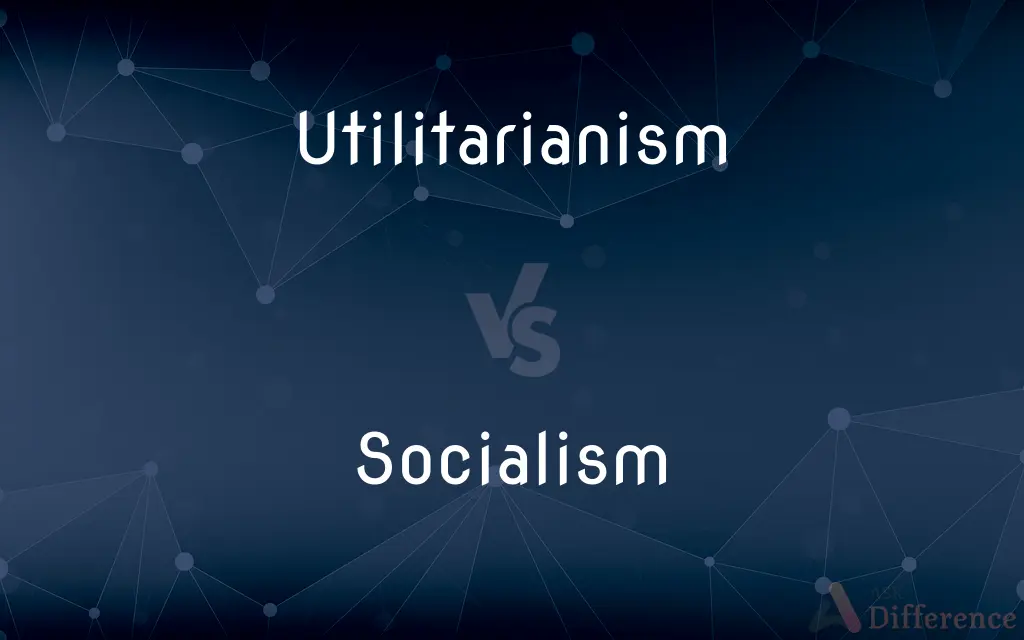Utilitarianism vs. Socialism — What's the Difference?
By Urooj Arif & Fiza Rafique — Updated on April 8, 2024
Utilitarianism is a moral philosophy focusing on outcomes, while socialism is an economic system prioritizing societal ownership and equity.

Difference Between Utilitarianism and Socialism
Table of Contents
ADVERTISEMENT
Key Differences
Utilitarianism is a moral and ethical theory that posits the best action is the one that maximizes utility, generally defined as that which produces the greatest well-being of the greatest number of people. On the other hand, socialism is an economic and political system where the means of production, distribution, and exchange are owned or regulated by the community as a whole, with an emphasis on reducing inequalities and promoting social welfare.
While utilitarianism is concerned with the consequences of actions and policies in terms of happiness or well-being, socialism focuses on the means of achieving social equity through collective ownership and the redistribution of wealth. Utilitarian principles can be applied within various economic systems, including capitalism and socialism, to guide decisions towards maximizing overall happiness. In contrast, socialism specifically aims to structure the economy and society to promote equality and meet the basic needs of all individuals.
Utilitarianism, as a theory, can support a range of political and economic structures, depending on what is believed to maximize overall happiness. This flexibility means that a utilitarian might argue for or against socialist policies based on their anticipated outcomes. Socialism, however, provides a specific framework for organizing society and the economy, advocating for the collective or governmental control of production means to ensure fair distribution and to minimize social and economic inequalities.
Utilitarianism assesses actions by their outcomes without a predefined stance on ownership or economic systems. Its adaptable nature allows for the endorsement of various policies and practices as long as they are believed to maximize happiness or well-being. Conversely, socialism inherently critiques capitalistic systems of private ownership, arguing that they lead to inequality and social injustice, and proposes an alternative system centered on communal ownership and equitable distribution.
One of the criticisms of utilitarianism is that it could, in theory, justify actions that harm the minority if these actions benefit the majority, highlighting potential ethical dilemmas. Socialism faces criticism for potentially stifling individual initiative and economic efficiency, as critics argue that it reduces incentives for innovation and hard work. Both ideologies aim to improve societal well-being but approach this goal through different means and with distinct emphases on individual versus collective welfare.
ADVERTISEMENT
Comparison Chart
Definition
A moral philosophy that prioritizes actions leading to the greatest happiness for the greatest number.
An economic and political system advocating for communal ownership and equitable distribution.
Focus
Consequences of actions in terms of happiness and well-being.
Economic and social equity through communal ownership.
Application
Can be applied within any economic system to guide moral decisions.
Specific framework for organizing society and economy.
Key Principle
Maximizing utility or happiness.
Reducing social and economic inequalities.
Criticism
Can justify harm to minorities if it benefits the majority.
May reduce individual initiative and economic efficiency.
Compare with Definitions
Utilitarianism
Focuses on outcomes rather than intentions.
A utilitarian evaluates the ethicality of actions based on their results.
Socialism
Aims to reduce social and economic inequalities.
Socialism seeks to provide equal access to resources and opportunities for all.
Utilitarianism
Can involve complex calculations of happiness.
Utilitarianism requires assessing the potential happiness generated by different actions.
Socialism
Criticized for possibly limiting economic freedom.
Critics argue socialism reduces incentives for innovation and hard work.
Utilitarianism
Critiqued for potentially overlooking individual rights.
Critics argue utilitarianism could justify sacrificing a few for the majority's happiness.
Socialism
An economic system with communal ownership.
Socialism advocates for the public control of major industries to ensure equitable distribution.
Utilitarianism
A philosophy maximizing happiness across society.
Utilitarianism might support free healthcare if it increases overall happiness.
Socialism
Often involves government intervention in the economy.
Socialists support policies like wealth redistribution to achieve equity.
Utilitarianism
Adaptable to various policies for societal well-being.
Utilitarians might endorse different economic policies based on their anticipated happiness outcomes.
Socialism
Can be democratic or authoritarian, depending on governance.
Democratic socialism combines majority rule with social ownership, while authoritarian socialism may suppress political dissent.
Utilitarianism
Utilitarianism is a family of normative ethical theories that prescribe actions that maximize happiness and well-being for all affected individuals. Although different varieties of utilitarianism admit different characterizations, the basic idea behind all of them is to in some sense maximize utility, which is often defined in terms of well-being or related concepts.
Socialism
Socialism is a political, social, and economic philosophy encompassing a range of economic and social systems characterised by social ownership of the means of production. It includes the political theories and movements associated with such systems.
Utilitarianism
The belief that the value of a thing or an action is determined by its utility.
Socialism
Any of various theories or systems of social organization in which the means of producing and distributing goods is owned collectively or by a centralized government that often plans and controls the economy.
Utilitarianism
The ethical theory proposed by Jeremy Bentham and James Mill that all action should be directed toward achieving the greatest happiness for the greatest number of people.
Socialism
The stage in Marxist-Leninist theory intermediate between capitalism and communism, in which the means of production are collectively owned but a completely classless society has not yet been achieved.
Utilitarianism
The quality of being utilitarian
Housing of bleak utilitarianism.
Socialism
Any of various economic and political theories advocating collective or governmental ownership and administration of the means of production and distribution of goods.
Utilitarianism
(philosophy) A system of ethics based on the premise that something's value may be measured by its usefulness.
Socialism
A system of social and economic equality in which there is no private property.
Utilitarianism
(philosophy) The theory that action should be directed toward achieving the "greatest happiness for the greatest number of people" (hedonistic universalism), or one of various related theories.
Socialism
A system or condition of society in which the means of production are owned and controlled by the state.
Utilitarianism
The doctrine that the greatest happiness of the greatest number should be the end and aim of all social and political institutions.
Socialism
(Marxism-Leninism) The intermediate phase of social development between capitalism and communism in Marxist theory in which the state has control of the means of production.
Utilitarianism
The doctrine that virtue is founded in utility, or that virtue is defined and enforced by its tendency to promote the highest happiness of the universe.
Socialism
Any of a group of later political philosophies such democratic socialism and social democracy which do not envisage the need for full state ownership of the means of production nor transition to full communism, and which are typically based on principles of community decision making, social equality and the avoidance of economic and social exclusion, with economic policy giving first preference to community goals over individual ones.
Utilitarianism
The doctrine that utility is the sole standard of morality, so that the rectitude of an action is determined by its usefulness.
Socialism
Any left-wing ideology, government regulations, or policies promoting a welfare state, nationalisation, etc.
Utilitarianism
Doctrine that the useful is the good; especially as elaborated by Jeremy Bentham and James Mill; the aim was said to be the greatest happiness for the greatest number
Socialism
A theory or system of social reform which contemplates a complete reconstruction of society, with a more just and equitable distribution of property and labor. In popular usage, the term is often employed to indicate any lawless, revolutionary social scheme. See Communism, Fourierism, Saint-Simonianism, forms of socialism.
[Socialism] was first applied in England to Owen's theory of social reconstruction, and in France to those also of St. Simon and Fourier . . . The word, however, is used with a great variety of meaning, . . . even by economists and learned critics. The general tendency is to regard as socialistic any interference undertaken by society on behalf of the poor, . . . radical social reform which disturbs the present system of private property . . . The tendency of the present socialism is more and more to ally itself with the most advanced democracy.
We certainly want a true history of socialism, meaning by that a history of every systematic attempt to provide a new social existence for the mass of the workers.
Socialism
A political theory advocating state ownership of industry
Socialism
An economic system based on state ownership of capital
Common Curiosities
Can utilitarianism support socialist policies?
Yes, utilitarianism can support socialist policies if they are believed to maximize overall happiness and well-being.
How do utilitarianism and socialism approach individual rights?
Utilitarianism focuses on the greatest overall happiness, which might sacrifice individual rights for the majority’s benefit, while socialism emphasizes collective ownership and rights, potentially at the cost of individual economic freedoms.
What is utilitarianism?
Utilitarianism is a moral theory that emphasizes the greatest happiness for the greatest number as the primary ethical goal.
Are there different types of utilitarianism?
Yes, there are several types, including act utilitarianism (assessing each action separately) and rule utilitarianism (following rules that generally maximize happiness).
How does utilitarianism differ from socialism?
Utilitarianism is an ethical theory focusing on outcomes and happiness, while socialism is an economic system focusing on communal ownership and equity.
What is the main goal of socialism?
The main goal of socialism is to reduce social and economic inequalities through communal ownership and equitable distribution of resources.
Do all socialists reject capitalism entirely?
Not all; some socialists advocate for a mixed economy, combining elements of capitalism with significant socialist policies for welfare and equity.
How do utilitarians measure happiness?
Utilitarians may use various methods, including hypothetical scenarios and preference satisfactions, to gauge potential happiness outcomes.
Can utilitarian principles justify unethical actions?
Critics argue that utilitarianism might justify ethically questionable actions if they lead to a greater overall happiness.
Is socialism against private ownership?
Socialism advocates for communal or state ownership of the means of production, which often limits or regulates private ownership to reduce inequalities.
Can a utilitarian be against socialism?
Yes, a utilitarian might oppose socialism if they believe other economic systems better maximize happiness and well-being.
Is utilitarianism applicable in personal decisions?
Yes, utilitarianism can guide personal ethical decisions by considering the impact of actions on overall happiness.
How do critics view the impact of socialism on innovation?
Critics argue that socialism, by reducing personal incentives, can dampen innovation and economic efficiency.
What challenges face the implementation of socialism?
Challenges include balancing economic efficiency with equity, avoiding bureaucratic inefficiencies, and ensuring democratic participation.
Share Your Discovery

Previous Comparison
Contrast vs. Emphasis
Next Comparison
Theorbo vs. LuteAuthor Spotlight
Written by
Urooj ArifUrooj is a skilled content writer at Ask Difference, known for her exceptional ability to simplify complex topics into engaging and informative content. With a passion for research and a flair for clear, concise writing, she consistently delivers articles that resonate with our diverse audience.
Co-written by
Fiza RafiqueFiza Rafique is a skilled content writer at AskDifference.com, where she meticulously refines and enhances written pieces. Drawing from her vast editorial expertise, Fiza ensures clarity, accuracy, and precision in every article. Passionate about language, she continually seeks to elevate the quality of content for readers worldwide.
















































